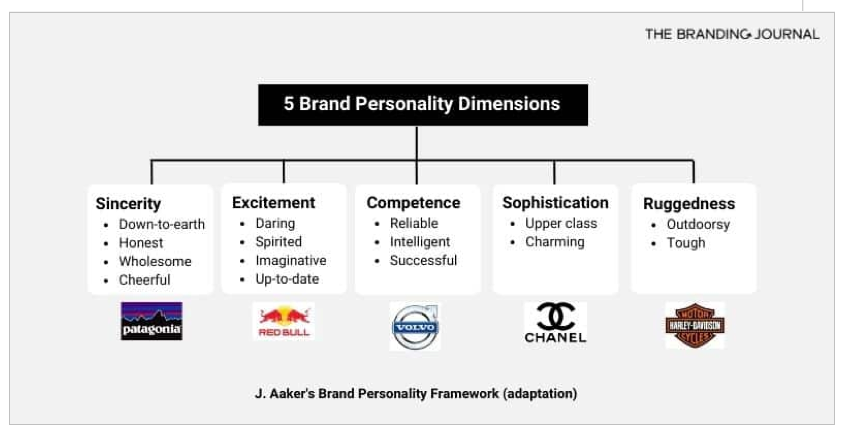Understanding brand personality and its importance to branding
Brand personality refers to the human-like traits or characteristics given to a brand. It is the set of qualities, emotions, and values that consumers associate with a particular brand, similar to how they perceive personalities in people. An effective tool that can differentiate a brand and enhance customers’ views.
Just as you can describe a friend or a person you just met, that is how we can also describe brand. These traits can include features like sincerity, excitement, competence, refined, appealing or irregular.
Let us discuss some of its significance in branding:
Help to differentiate businesses
In a crowded marketplace, where products and services can be quite similar, a unique brand personality helps a company to be distinct from competitors. It gives consumers a reason to choose one brand over another.
Creates consumer emotional connection
Brand personality allows consumers to relate to the brand on a personal level, encouraging emotions and building trust and loyalty. When consumers feel an emotional connection with a brand, they are more likely to purchase repeatedly.
Consistency
A well-defined brand personality provides a concept for consistent messaging and branding across all channels. Consistency helps fortify the brand’s identity and makes it more memorable to consumers.
Lead to brand expansion
A strong brand personality can be a way to extend the brand into new products or markets. Consumers are more likely to trust and try new offerings from a brand they already have a positive and emotional connection.
Enhances brand equity
Over time, a strong brand personality can contribute to the development of brand equity, which is the commercial value obtain from consumer views about the brand. Brand equity can lead to higher sales, premium pricing, and greater adaptability and resilience against competitive pressures.
Creates Long-term interactions
Building a brand personality encourages long-term relationships with consumers. When consumers feel a connection with a brand, they are more likely to remain loyal even when faced with competitive alternatives.
Influence of brand personality on consumer behavior
Alters buyers purchase decisions. Consumers are more likely to purchase from brands with personalities that favors them. When you first see their logo, you quickly recognize the company and remember several products you have previously used from that company.
Brand earns loyalty. With time, people develop strong relationships with particular companies; a strong brand personality can ensure loyalty among consumers. Regardless of whether there are better options available, this sense of attachment will keep consumers loyal to the brand.
Creates brand advocacy. Consumers who identify with a brand’s personality may become advocates for the brand by recommending it to others and defending it against criticism. These consumers can be powerful influencers in driving sales and shaping public image of the brand.
Brand attracts consumer engagement. Brands with compelling personalities tend to attract higher levels of engagement from consumers. Whether through social media interactions, brand-related events, or other forms of participation, consumers are more likely to engage with brands that they feel an emotional attachment.
Creates buyers aspiration on perceived value. Reputable and established brands will typically reflect this in their price. Brand personality can influence how consumers perceive the value of a product or service. Brands with strong personalities are often able to command higher prices and justify premium pricing even if other brands offer cheap prices, by emphasizing the unique qualities and experiences they offer.
Brand changes consumers’ experience. The personality of a brand shapes the overall experience that consumers have with the brand, from interactions with customer service representatives to the design of physical stores or online platforms. A consistent and authentic brand personality helps create positive experiences that encourage continuous business.
Alters consumers’ decision-making process. Brand personality can also play a role in the decision-making process itself. Consumers may use the personality of a brand as a way of evaluating options, particularly in situations where they have limited time or information against other brands.
Elements of brand personality
- Sincerity: Brands can convey sincerity by being genuine, honest, and down-to-earth such as Patagonia.
- Excitement: This is about creating energy and spirited, making customers feel excited about the brand experience, for example Red bull and Tesla.
- Competence: Brands that exude competence are reliable, efficient, and trustworthy in delivering their promises, think of Volvo or Microsoft.
- Sophistication: Sophisticated brands are classy, upper class, and often appeal to a more refined taste, a good example is Channel and Apple.
- Ruggedness: This trait is associated with toughness, durability, and strength, appealing to adventurous or outdoorsy individuals just like Land Rover.

Why is brand personality Important?
- Differentiate brand from competitors: In a crowded marketplace, a unique personality helps a brand stand out from competitors. It gives consumers a reason to choose one brand over another.
- Enhances Emotional Connection: A strong brand personality creates an emotional connection with consumers. When people align with a brand’s personality, they are more likely to develop loyalty and advocacy.
- Brand Consistency: Having a defined personality guides all aspects of brand communication and behavior, ensuring consistency across various channels. This consistency builds trust and enhances the brand’s identity.
- Customer Engagement: A compelling brand personality increases interest and engagement. It encourages interactions and conversations with consumers, leading to deeper relationships and brand natural attraction.
- Enhances brand storytelling: A distinct personality provides a narrative framework for brand storytelling. It humanizes the brand, making it easier for consumers to relate to and remember thus boosting trust.
How to develop brand personality
- Analyze the competition
Learn about your competitors and how they present themselves to consumers. Maybe you sell outdoor gear and all your competitors exemplify ruggedness. To be different, you may want to develop a brand personality that encourages sincerity. Just make sure that whatever personality you hope to develop is still authentic and represents your company well.
- Choose Personality Traits:
Based on your brand values and audience views, select a set of personality traits that align with your brand identity. Consider traits like sincerity, excitement, competence, sophistication, or ruggedness.
- Personify your brand
Develop a clear brand identity that connects with your target audience. How does the brand behave in person? This can help you develop a brand voice to match your brand personality. Develop brand guidelines that will outline how your brand personality should be expressed across various areas, including visual elements, tone of voice, and messaging.
- Incorporate it with other brand elements
Other brand elements that show personality include logo design, font style, tone of voice, and color choice. People associate symbols, typography, and colors with personality traits. Match these design elements with your brand personality to create a sense of cohesiveness.
- Monitor to maintain consistency
To maintain brand personality, consistency is key. Monitor consumer feedback and market trends to continuously refine and evolve your brand personality. You can always revisit what works versus what does not and make any necessary adjustments—but once started, remain committed to your brand personality. For example, if you are committed to having a rugged personality, do not all of a sudden try to present your business as sophisticated. This can confuse customers and turn them away.
Example of brand personality in real life
- Coca-Cola
Coca-Cola blends its brand personality with excitement and sincerity. Its holiday packaging, brand colors, new flavors, and multiple campaigns, such as “Share a Coke,” “taste the feeling” evoke feelings of joy, optimism, and innovation. Coca Cola’s brand personality and voice feel like an old friend season after season.
- Chanel
The Chanel brand is classic, yet modern and sophisticated. Targeted toward elite demographic, Chanel products supply a high level of prestige for the consumer and appeal to an audience that longs for connection and intimacy with a brand that values style and beauty. The Lover archetype is drawn toward the brand for its sensuality and strong connection.
- Apple
As a leading technology developer, Apple is known for its innovation and leadership. Apple has made a name for itself with its competent brand personality. Inspired with excitement, the Apple brand appeals to a broad audience and is known for its superior products. Its brand recognition and differentiation eliminate the need for sales or lower prices and cuts out price wars among competitors. The Apple brand wants to change the world with visionary products that only The Magician archetype can deliver.
- REI
REI’s unique beginnings and business structure as a consumer cooperative retailer differentiates the brand from others. REI can put all of its focus and attention on a smaller position of consumers. The outdoor store REI attracts adventurous, outdoorsy consumers. REI’s brand personality is rugged and strong. Explorer archetypes love adventure and are drawn to this brand personality.
- Disney
Disney brings the promise of magic into consumers’ lives and makes dreams come true. Since its start, Disney holds a strong position and continues to design magical experiences in stores, at its parks, and on the screen. Much like Jung’s Ego types, the Disney brand makes big promises and delivers. The Disney personality is truly that of a magician and is known for its imaginative and child-like wonder.
Key strategies to maintain brand personality
- Brand Guidelines: Develop comprehensive brand guidelines that outline your brand personality, including tone of voice, visual identity, and key messaging. Ensure that these guidelines are easily accessible to everyone involved in brand communication.
- Training and Education: Provide training and education to employees, partners, and stakeholders on the importance of maintaining brand personality. Help them understand the brand values and how to use them in their interactions with customers and in their work.
- Consistent Messaging: Ensure that all brand communications, across various channels, are aligned with your brand personality. This includes advertising, social media, website content, and customer service engagement.
- Visual Identity: Maintain consistency in visual elements such as logo, color palette, typography, and imagery. These visual items contribute to ensuring brand personality and creating a strong brand experience.
- Adaptability: While consistency is important, also be prepared to adapt to changing trends, customer preferences, and market dynamics. Your brand personality should remain true to its core values while being flexible enough to update with times.
- Feedback and Monitoring: Regularly gather feedback from customers and monitor brand perception through surveys, social media listening, and other feedback channels. Use this information to assess how well your brand personality is influencing your audience and make changes as needed.
- Internal Alignment: Ensure that you align everyone within your organization with the brand personality and understands his or her role in upholding it. Develop a culture that embraces and encourages the brand values in all aspects of the business.
- Authenticity: Above all, maintain authenticity in your brand personality. Authenticity builds trust with consumers and strengthens brand loyalty. Avoid inconsistencies or behaviors that may reduce the credibility of your brand personality.
Summary
A strong, well-defined, attractive brand personality is vital to cultivating a lasting relationship between an organization and its audience.
As human beings, we tend to move towards brands that represent our ideals in the world, and represent them in. We look to brands to help define us, whether through the clothes we wear, the technology we use, or the food we consume. A personality helps make it easier for brands to negotiate the purchase decision.
References
• [1] Lischer, B. The Psychology of Brand Personality https://www.ignytebrands.com/the-psychology-of-brand-personality/
• [2] Kapferer, J. The New Strategic Brand Management (2012).
• [3] Aaker, J. The Brand Personality Framework. https://fac.ksu.edu.sa/sites/default/files/dimensions_of_brand_personality_0.pdf
• [4] Harvard Business Review. Willigan, G. High-Performance Marketing: An Interview with Nike’s Phil Knight. https://hbr.org/1992/07/high-performance-marketing-an-interview-with-nikes-phil-knight
• [5] A study finds that Apple has the most loyal smartphone customers in the US. Appleinsider.com https://appleinsider.com/articles/21/10/29/apple-has-most-loyal-smartphone-customers-in-us-study-finds#:~:text=According%20to%20a%20report%20from,from%20a%20previous%20iPhone%20model.
• [6] Starbucks Mission Statement. https://stories.starbucks.com/press/2015/starbucks-mission-and-values/

